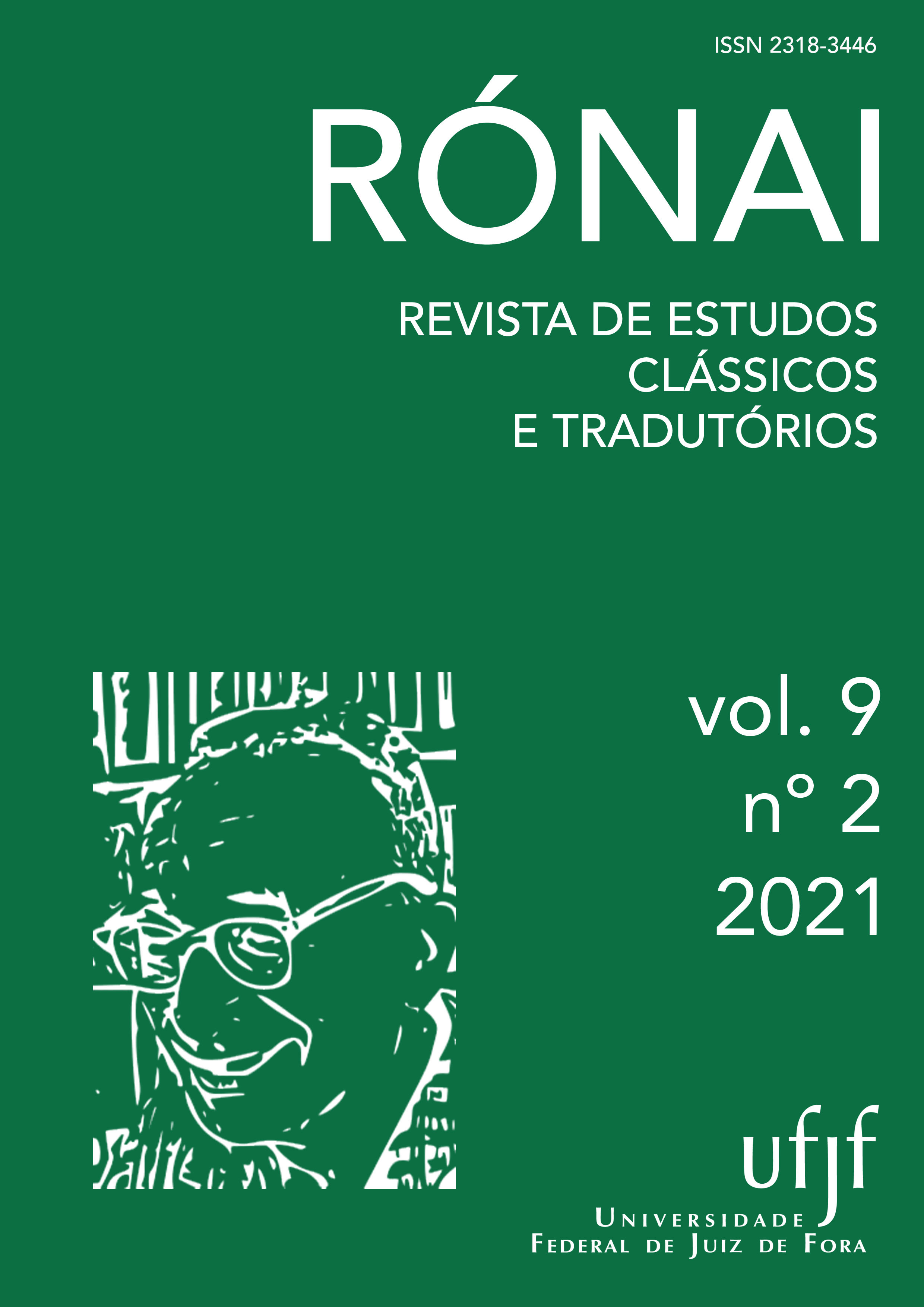Ulysses proficiens. A reassessment of Seneca’s reading
DOI:
https://doi.org/10.34019/2318-3446.2021.v9.35820Palabras clave:
Seneca, Ulysses, Stoicism, VirtueResumen
This article offers a new reading of Seneca’s Ulysses. He will be proven not to stand for the Stoic hero, the symbol of virtue; rather, he will turn out to represent the proficiens – those who make any effort to reach virtue, and yet sometimes fail. In this regard, Ulysses is like Seneca himself, in as much as both of them appear to do their best to face the impetuous waves of fortune.
Descargas
Citas
ASMIS, E. Seneca’s originality. In: BARTSCH, S.; SCHIESARO, A. (eds.). The Cambridge Companion to Seneca. Cambridge: Cambridge University Press, 2015. p. 224-238.
BENATOUÏL, T. Le débat entre stoïcisme et platonisme à propos de la vie scolastique: Chrysippe, l'Ancienne Académie, Antiochus. In: BONAZZI, M.; HELMIG, C. Platonic Stoicism-Stoic Platonism. The Dialogue between Platonism and Stoicism in Antiquity. Leuven: Leuven University Press, 2007. p. 1-21.
BENATOUÏL, T. Theôria and scholê in Epictetus and Marcus Aurelius: Platonic, Stoic or Socratic?. In: LONG, A. G. (ed.). Plato and the Stoics. Cambridge: Cambridge University Press, 2007. p. 147-173.
BENATOUÏL, T. Θεωρία et vie contemplative du stoïcisme au platonisme. Chrysippe, Panétius, Antiochus et Alcinoos”, In: BONAZZI, M.; OPSOMER, J. The Origins of the Platonic System. Platonisms of the Early Empire and their Philosophical Contexts. Louvain-Namur-Paris-Walpole: Peeters, 2009. p. 3-31.
BERNO, F. Il cavallo saggio e lo stolto Enea. Due citazioni virgiliane nelle Epistulae ad Lucilium di Seneca (56, 12-14; 95, 68-71). Acta Classica, v. 49, p. 55-78, 2006.
BERNO, F. Ulisse ed Ercole Victores omnium terrorum? Nota testuale a Sen. const. 2, 1. Rheinisches Museum, v. 159, p. 409-415, 2016.
BONAZZI, M. Antioco di Ascalona su Ulisse e il desiderio umano di conoscenza (a proposito di Cicerone, De finibus bonorum et malorum, V 48-50). In: CATTANEI, E.; NATALI, C. Studi sul medioplatonismo e il neoplatonismo. Roma: Edizioni di Storia e Letteratura, 2019. p. 1-14.
BUFFIÈRE, F. Les mythes d'Homère et la pensée grecque. Paris: Les Belles Lettres, 1956.
CAMBIANO, G. Seneca e le contraddizioni del sapiens. In: GARBARINO, G.; LANA, I. (eds.). Incontri con Seneca. Atti della giornata di studio Torino, 26 ottobre 1999. Bologna: Pàtron, 2001. p. 49-60.
CHAUMARTINE, F. R. Philosophical tragedy?. In: DAMSCHEN, G.; HEIL, A. (eds.). Brill’s Companion to Seneca. Leiden-Boston: Brill, 2014. p. 653-672.
CLASSEN, C. J. Le virtù nelle lettere di Seneca a Lucilio. In: PARRONI, P. Seneca e il suo tempo. Salerno: Salerno Editrice, 2000. p. 275-294.
DELLE DONNE, C. Ulysses philosophus: a plausible reading?, Aevum Antiquum, v. 21, (forthcoming)
GIGANTE LANZARA, V. Il segreto delle sirene. Napoli: Bibliopolis, 2007.
HICKS, R. D. (ed.). Diogenes Laertius. Lives of eminent philosophers. Volume 2. Cambridge: HUP, 1925.
LÉVY, C. Les philosophies hellénistiques. Paris: Librairie Génerale Française, 1997.
LONG, A. A. La filosofia ellenistica: stoici, epicurei e scettici. Bologna: Il Mulino, 1989.
LONG, A. A.; SEDLEY, D. N. (eds.). The Hellenistic Philosophers. Cambridge: Cambridge University Press, v. 1, 1987.
MONTIGLIO, S. Wandering philosophers in classical Greece. The Journal of Hellenic Studies, v. 120, p. 86-105, 2000.
MOTTO, A. L.; CLARK, M. Essays on Seneca. Frankfurt-New York: Peter Lang, 1993.
PARENTE, M. I. Introduzione a lo Stoicismo ellenistico. Roma-Bari: Laterza, 1993.
PERUTELLI, A. Ulisse nella cultura romana. Firenze: Le Monnier Università, 2006.
PIERINI, R. D. I. Cicerone in Seneca: alcune riflessioni su un tema sempre attuale. Ciceroniana on line, v. 2, n. 1, p. 13-38, 2018.
RUSSELL, D. Virtue as Likeness to God in Plato and Seneca. Journal of the History of Philosophy, v. 42, n. 3, p. 241-260, 2004.
SENECA. Selected Philosophical Letters. Translated with introduction and commentary by B. Inwood. Oxford: Clarendon Press, 2007.
SENECA. De constantia sapientis - La fermezza del saggio. Intr., trad. e comm. di F. R. Berno. Napoli: Paolo Loffredo Iniziative Editoriali, 2018.
SENECA. Moral Essays. English translation by J. W. Basore. London-New York: W. Heinemann-G.P. Putnam’s sons, v. 1, 1928.
SENECA. Selected Letters. New translation by E. Fantham. Oxford: Oxford University Press, 2010.
TORRE, C. A margine del mito di Ulisse in Seneca prosatore. In: SETAIOLI, A. Apis Matina. Studi in onore di Carlo Santini. Trieste: Edizioni Università di Trieste, 2016. p. 704-714.
TRAINA, A. Lo stile drammatico del filosofo Seneca. Bologna: Pàtron, 1987.
TSOUNI, G. Antiochus on contemplation and the happy life. In: SEDLEY, D. N. (ed.). The philosophy of Antiochus. Cambridge: Cambridge University Press, 2012. p. 131-150.
WILDBERGER, J. Wisdom and Virtue. In: DAMSCHEN, G; HEIL, A. Brill’s Companion to Seneca. Leiden-Boston: Brill, 2014. p. 301-322.
Descargas
Publicado
Cómo citar
Número
Sección
Licencia
Derechos de autor 2021 Carlo G. Delle Donne

Esta obra está bajo una licencia internacional Creative Commons Atribución 4.0.
Derechos de autor
Los autores que publican en esta revista aceptan los siguientes términos:
1. Los autores y las autoras conservan los derechos de autor y le otorgan a la revista el derecho a la primera publicación, que está bajo la licencia Creative Commons Attribution License 4.0 Internacional.
2. Los autores y las autoras pueden publicar y compartir el trabajo con reconocimiento de la publicación inicial en esta revista.
3. Los autores y las autoras de las obras aprobadas autorizan a la revista a asignar el contenido de sus obras, después de la publicación, para su reproducción en indexadores de contenido, bibliotecas virtuales y similares.
Para obtener más información sobre Creative Commons Attribution License 4.0 Internacional, acceda a: https://creativecommons.org/licenses/by/4.0/deed.es
Exención editorial
El contenido de los artículos publicados es responsabilidad única y exclusiva de sus autores, y no representa la posición oficial de Rónai - Revista de Estudos Clássicos e Tradutórios o de la Faculdade de Letras de la Universidad Federal de Juiz de Fora o instituciones asociadas.



